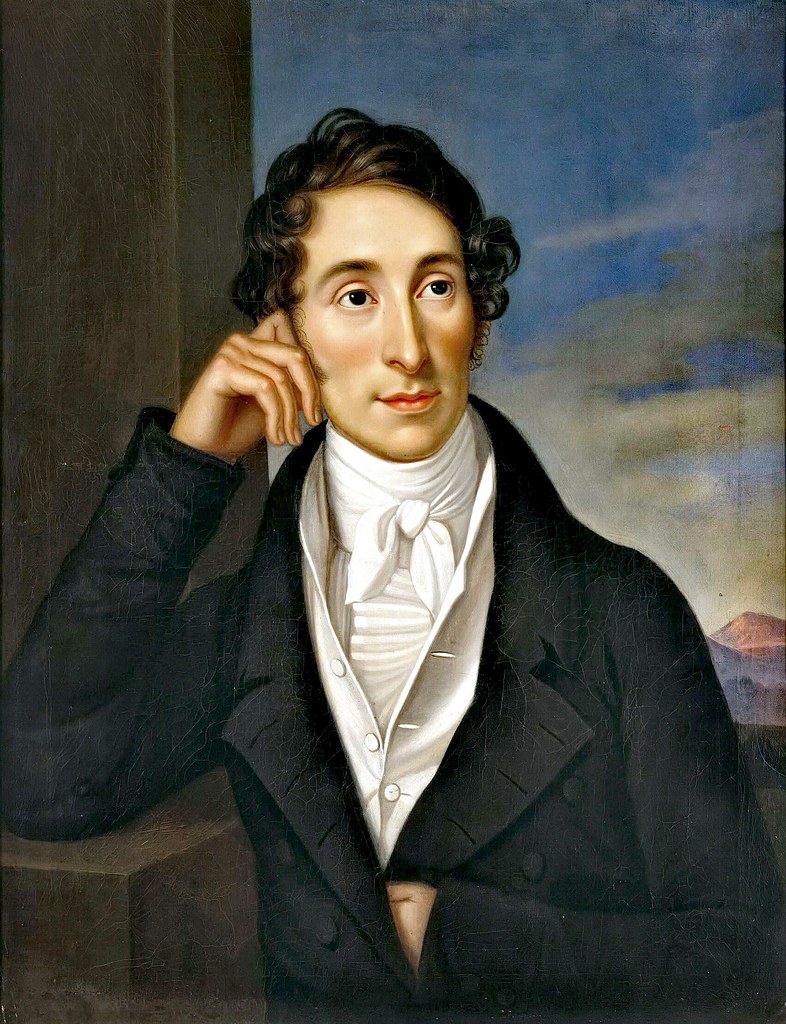Carl Maria von Weber (1786-1826)
- Missa No.2 a 4tro concertato (c.1818)
Performers: Henriеttе Schеllеnbеrg (soprano); Gеorge Rοbеrts (baritone); Lаvеrnе G'Frοеrеr (mezzo-soprano);
Kеith Bοldt (tenor);
Vancouver Chamber Choir; CBC Vancouver Orchestra; Jοn Wаshburn (conductor)
---
Composer, conductor, pianist and critic, son of Franz Anton Weber
(1734-1812) and brother of Edmund Weber (1766-1831) and Fridolin Weber
(1761-1833). He was born into a musical and theatrical family. His
father was a musician and soldier of fortune who had formed a small
traveling theatre company. His mother, Genovefa, was a singer; his
uncles, aunts, and brothers were to some degree involved in music and
the stage. Carl Maria was a sickly child, having been born with a
diseased hip that caused him to limp throughout his life. When he began
to show signs of musical talent, his ambitious father set him to work
under various teachers in towns visited by the family troupe in the hope
that he might prove a Mozartean prodigy. Among these instructors was
Michael Haydn. Under Haydn, he wrote and published his Opus 1, Sechs
Fughetten (1798). The troupe paused briefly in Munich, where he learned
the art of lithography under its inventor, Aloys Senefelder. Moving on
to Freiberg, the Webers planned to set up a lithographic works in order
to propagate the young composer’s music. On a return visit to Salzburg,
he completed his first wholly surviving opera, Peter Schmoll und seine
Nachbarn, which failed when it was produced in Augsburg in 1803. He
resumed his studies under the influential Abbé Vogler, through whom he
was appointed musical director at Breslau in 1804. After many
difficulties, occasioned by the inexperience of a young director in
putting through reforms, and a near-fatal accident in which he
permanently impaired his voice when he swallowed some engraving acid,
Weber was forced to resign. He was rescued by an appointment as director
of music to Duke Eugen of Württemberg, for whose private orchestra he
wrote two symphonies. Weber was next a secretary in the court of King
Frederick I of Württemberg. Here he lived so carelessly and ran up so
many debts that, after a brief imprisonment, he was banished. He and his
father fled to Mannheim, where he was, in his own words, “born for the
second time.”
He made friends with an influential circle of artists, from whom he
stood out as a talented pianist and guitarist; he was also remarkable
for his theories on the Romantic movement. Moving on to Darmstadt, he
met Vogler again, as well as the German opera composer Giacomo
Meyerbeer. From 1809 to 1818 he also wrote a considerable number of
reviews, poems, and uncompromising, stringent music criticisms. All his
work, music, and critical writings furthered the ideals of Romanticism
as an art in which feeling took precedence over form and heart over
head. Appointed conductor of the opera at Prague in 1813 he was at last
able to put his theories into full practice. His reputation by now was
such that he was able to secure an appointment as director of the German
opera at Dresden, beginning in 1817. The same year he married one of
his former singers, Caroline Brandt. As the prophet of a German national
opera, he was faced with even greater difficulties. It was in Dresden
that he began to work on Der Freischütz, which was an immediate success
when it was performed in Berlin in 1821. When Covent Garden in London
commissioned a new opera, he took on the task of learning English and
working with a librettist, James Robinson Planché, by correspondence.
His motive was to earn enough money to support his family after his
death, which he knew to be not far off. In form, Oberon was little to
his taste, having too many spoken scenes and elaborate stage devices for
a composer who had always worked for the unification of the theatrical
arts in opera. But into it he poured some of his most exquisite music,
and he traveled to London for the premiere in 1826. Barely able to walk,
he was sustained by the kindness of his host, Sir George Smart, and by
the longing to get home again to his family. Oberon was a success and he
was feted, but his health was declining fast. Shortly before he was due
to start the journey back to Germany, he was found dead in his room.

Cap comentari:
Publica un comentari a l'entrada